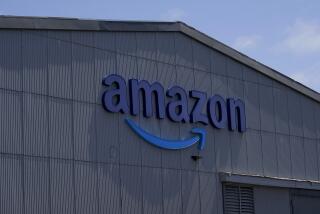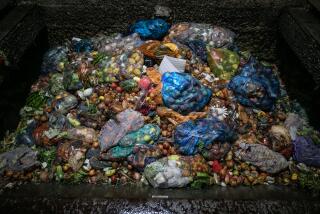Do or Daewoo
- Share via
Undeterred by the economic problems plaguing its homeland, Daewoo Motors Inc. will begin selling cars in the United States late this summer with a slew of innovative marketing ideas and a pitch aimed at the college crowd.
Tactics that could include free insurance and below-market financing plans are “the kinds of things that should get them noticed, maybe even called revolutionary,” said Wes Brown, an industry analyst with Nextrend in Thousand Oaks.
“They may be new to the U.S.,” Brown said, “but they’ve established a presence elsewhere that suggests they could come out swinging.”
Daewoo will be the third South Korean auto maker--and the 10th from Asia--to enter the crowded and stagnant U.S. market and industry watchers say its success is far from assured.
But Daewoo, which already sells cars in 130 countries, needs a U.S. presence to be a true global player and it appears willing to go to extreme lengths to secure it.
Company officials say they delayed the start of U.S. sales for nearly a year to make sure its cars meet the quality and reliability standards American consumers demand.
“We must be in America to gain our goal of being in the Top 10 of the world’s car makers,” Daewoo Motor America Inc.’s president, W.H. Kim, said in a recent interview. “The input we will get from the biggest car market in the world is invaluable to us.”
While huge, the market for new cars and light trucks in this country is expected to remain flat at about 15 million vehicles a year in the foreseeable future. Some analysts predict a slight downturn this year, to about 14.7 million, from 15.2 million in 1997.
Daewoo’s goal, Kim said, is to hit annual sales of 100,000 cars in the U.S. within five years. It took Japan’s Mitsubishi Motor Corp. six years to hit that mark, while South Korea’s Hyundai Motor Co. did it in a year with a car priced several thousand dollars lower than anything else on the market at the time.
“It’s a reasonable goal if they add a sport-utility vehicle to their line within the five years and everything else goes well for them,” said consultant George Peterson of AutoPacific Inc.
But Daewoo must overcome the negative image many U.S. consumers have of South Korean cars--an image forged when Hyundai ditched quality control in its fervor to keep up with the demand for its low-priced Excel. And then, to achieve its sales goal, Daewoo must then either take customers from established competitors or turn used-car shoppers into new-car buyers, Peterson said. “They will have to do something dramatically different to be considered a viable competitor.”
Kim said Daewoo will do just that, but he insists it is too early to disclose specifics of the plan.
He also shrugs off suggestions that South Korea’s economic turmoil will hamper Daewoo’s U.S. sales drive. Like all other Korean car makers, he says, Daewoo faces “challenges” in its home market, where car sales are expected to fall by 50% this year. Kia Motors Corp., the country’s No. 2 car maker, is insolvent and being run under government protection. And Daewoo itself is deep in negotiations with General Motors Corp. that could make GM half-owner of Daewoo Motors.
But the company, part of one of South Korea’s largest conglomerates, is solvent and serious about expanding to the U.S., and into Canada in 1999, Kim said.
Daewoo Group Chairman Kim Woo-Chong recently said that income from exports is “the only way to save our corporations and the economy.”
Compton-based Daewoo Motor America will begin U.S. sales in August or early September to coincide with the new school year, Kim said. It will open with just with 16 dealerships in nine states. Its biggest presence will be in Southern California, with dealerships in Huntington Beach, Van Nuys, Cerritos, Ontario and San Diego.
To pare distribution costs and, Kim claims, ensure an unprecedented level of customer service by eliminating the middleman, Daewoo will own and operate its own dealerships except in the six states where factory-owned auto retailers are illegal.
To provide service to Daewoo buyers wherever they live, the company plans to contract with regional or national auto-care chains that would become authorized Daewoo maintenance centers, Kim said. He said Daewoo also is considering setting up satellite sales offices, bereft of parts and service departments, to put its cars close to its target audience without the expense of building large, full-service dealership facilities.
Daewoo hopes to pick up sales in the Korean American community and among immigrants from South American nations such as Ecuador, Colombia, Chile and Peru, where the company’s cars already are big sellers.
But the main target, Kim said, is the American college community: students, faculty and parents who have been footing tuition bills and putting off new-car purchases because they are strapped for cash.
It is a used-car crowd, but Daewoo believes it can win converts. The company will launch sales with three models: the subcompact Lanos, with sedan and hatchback versions; the compact Nubira, in sedan, hatchback and station wagon styles; and the mid-size Leganza sedan.
A pair of sport-utility vehicles acquired when Daewoo bought South Korea’s Ssangyong Motor Co. last year are being altered for future additions to its U.S. lineup.
Prices have not been set, but are expected to range from about $9,000 to $11,000 for the Lanos models, from $12,000 to $15,000 for the Nubira line, and from $15,000 to $19,000 for the Leganza.
Translations of the Anglicized names, some borrowed from Latin, provide a glimpse into Daewoo’s psyche. Lanos, said Kim, means “joy to us.” Nubira is “a wish to cover the world.” And Leganza means “the strong person is coming.”
To establish an identity quickly, Daewoo is planning a series of attention-grabbing marketing ploys that include unusually liberal financing and, probably, a number of “giveaways” like the free insurance and prepaid taxes that helped Daewoo set a first-year sales record in England in 1995.
Later this month, the company also will put about 500 of its cars into the hands of key “opinion leaders” for extended test drives, said Gary Connelly, vice president of Daewoo’s western region sales and distribution subsidiary. Selected college athletes, student government officers, even faculty members and administrators will be given cars to use for several months, he said.
Daewoo officials acknowledge that car buyers in this country still consider South Korean-made cars to be inferior in performance, quality and even styling to Japanese and American-made cars.
But Kim and Connelly say their cars are good and they see the long-term test drives as a way to make fans of an influential group of people.
(BEGIN TEXT OF INFOBOX / INFOGRAPHIC)
Tough Market
Daewoo will face a crowded U.S. market that has not been kind to South Korean cars. Sales of new cars and trucks is not expected to increase soon so Daewoo will have to lure customers from other car makers. U.S. market share:
1987
General Motors: 35.0%
Ford: 23.2%
Chrysler: 13.5%
Toyota/Lexus: 6.3%
Honda/Acura: 5.0%
Nissan/Infiniti: 5.0%
Hyundai: 1.8%
Others: 10.2%
*
1997
General Motors: 31.1%
Ford: 25.2%
Chrysler: 15.2%
Toyota/Lexus: 8.1%
Honda/Acura: 6.2%
Nissan/Infiniti: 4.8%
VW/Audi: 1.1%
Hyundai: 0.7%
Others: 7.6%
Source: Automotive News
Researched by JANICE JONES DODDS / Los Angeles Times






